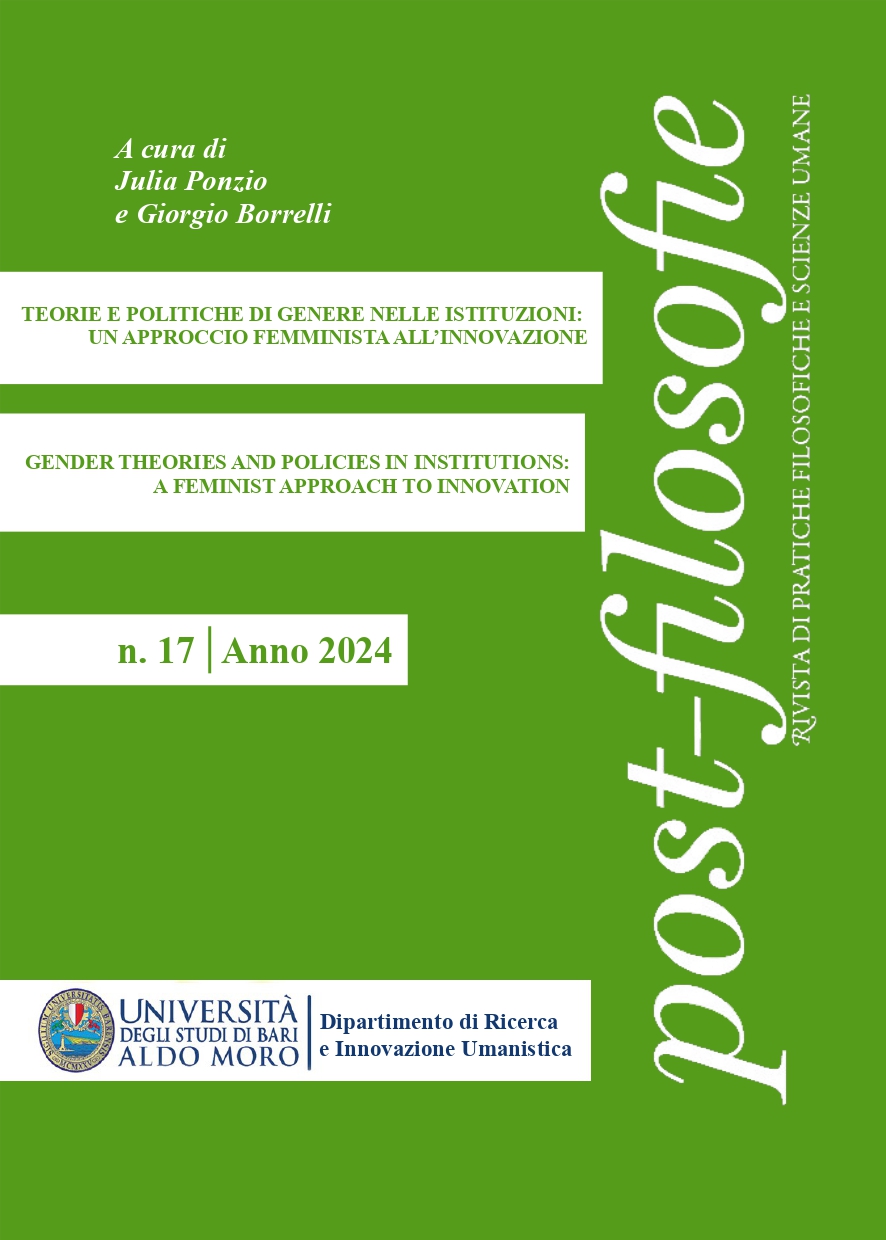I limiti delle strategie di contrasto al sessismo linguistico nelle imprese e nelle istituzioni: norme professionali di genere e ingiustizie discorsive
DOI:
https://doi.org/10.15162/1827-5133/2005Parole chiave:
atti linguistici, bias, ingiustizia discorsiva, pragmatica, vademecum, discursive injustice, pragmatics, speech actsAbstract
Nel presente articolo analizzeremo gli aspetti linguistici della gender equality. Infatti, nonostante l’attenzione che l’Unione Europea garantisce a questo aspetto, vedremo che le misure di contrasto tendenzialmente più adottate dalle istituzioni e dalle imprese italiane per opporsi agli usi sessisti del linguaggio non si rivelano sempre sufficienti. In primo luogo, analizzeremo un meccanismo di stereotipizza-zione strettamente connesso all’aspetto professionale evidenziando i suoi effetti nell’ostacolare l’avanzamento di carriera delle donne e il loro inserimento in settori economici considerati tipicamente maschili. In secondo luogo, analizzeremo le ricadute pragmatiche delle gendered power relations sulle comunicazioni evidenziando i loro effetti nel ridurre la forza linguistica delle donne sul lavoro. Infine, indicheremo possibili miglioramenti nelle misure di contrasto già esistenti e suggeriremo ulteriori azioni efficaci per prevenire gli effetti dannosi delle pratiche linguistiche sessiste.
In this paper we will analyse the linguistic aspects of gender equality. In fact, despite the attention that the European Union pays to this aspect, we will see that the measures adopted by Italian institutions and companies to oppose sexist uses of language do not always prove to be sufficient. Firstly, we will analyse a stereotyping mechanism closely connected to the professional aspect, highlighting its effects in hindering the career advancement of women and their insertion in sectors considered typically male. Secondly, we will analyse the pragmatic effects of gendered power relations on communications by highlighting their effects in reducing women’s linguistic force at work. Finally, we will point out possible improvements in existing countermeasures and suggest further effective actions to prevent the harmful effects of linguistic sexism.
Riferimenti bibliografici
AUSTIN J. L., Come fare cose con le parole, trad. it. di C. Villata, Marietti, Genova 1987.
BEAVER D. e STANLEY J., “Toward a Non-Ideal Philosophy of Language”, in «Graduate Faculty Philosophy Journal», 39, 2, 2019, pp. 501-545.
BUTLER J., Corpi che contano. I limiti discorsivi del “sesso”, trad. it. di S. Capelli e C. Fioravanti, Castelvecchi, Roma 2023.
―, Parole che provocano. Per una politica del performativo, trad. it. di S. Adamo, Raffaello Cortina, 2010.
FONDAZIONE LIBELLULA, Vita ed esperienze delle donne al lavoro, 2022.
HEILMAN M., “Gender Stereotypes and Workplace Bias”, in «Research in Organizational Behavior», 32, pp. 113-135, 2012.
INTERNATIONAL LABOUR ORGANIZATION, ACT/EMP Research note. Breaking barriers: Unconscious gender bias in the workplace, https://www.ilo.org/ wcmsp5/groups/public/---ed_dialogue/---act_emp/documents/publication /wcms_601276.pdf.
JAUCHER D. e FRIESEN J., “Evidence That Gendered Wording in Job Advertisements Exists and Sustains Gender Inequality”, in «Journal of Person-ality and Social Psychology», 2011, 101, 1, 109-128.
KUKLA Q. R., “Performative Force, Convention and Discursive Injustice”, in «Hypatia», 29, 2, 2014, pp. 440-457.
LANGTON R., “Pornography’s Authority? Response to Leslie Green”, in Ead., Sexual Solipsism. Philosophical Essay on Pornography and Objectification, Oxford University Press, Oxford, 2009.
―, “Speech Acts and Unspeakable Acts”, in «Philosophy & Public Affairs», 22, 1993, p. 293-330.
LINDVALL-ÖSTLING M., DEUTSCHMANN M. e ANDERS S., “An Exploratory Study on Linguistic Gender Stereotypes and their Effects on Perception”, in «Open Linguistic», 6, 2020, pp. 567-583.
MCGOWAN M. K., “On Pornography: MacKinnon, Speech Acts, and ‘False’ Construction”, in «Hypatia», 20, 3, 2005, pp. 22-49.
ROSSI-LANDI F., Il linguaggio come lavoro e come mercato, Bompiani, Milano 20035.
―, Ideologia. Per l’interpretazione di un operare sociale e la ricostruzione di un concetto, Meltemi, Roma 20052.
―, Semiotica e ideologia, Bompiani, Milano 20115.
SABATINI A., Il sessismo nella lingua italiana, Commissione Nazionale per la realizzazione della parità tra uomo e donna, Presidenza del Consiglio dei Ministri, Roma 1987.
SITOGRAFIA
https://commission.europa.eu/strategy-and-policy/policies/justice-and-fundame ntal-rights/gender-equality/gender-equality-strategy_it#strategia-per-la-parit%C3%A0-di-genere-2020-2025, (consultato il 04/06/2024).
https://eige.europa.eu/gender-mainstreaming/toolkits/gear/what-gender-equality-plan- gep?language_content_entity=en, (consultato il 04/06/2024).
Downloads
Pubblicato
Fascicolo
Sezione
Licenza
“Post-Filosofie” utilizza Open Journal Systems 2.4.8.5, che è un software open source per la gestione e la pubblicazione di riviste sviluppato, supportato e distribuito gratuitamente dal Public Knowledge Project sotto la GNU General Public License.
Gli autori che pubblicano su questa rivista accettano le seguenti condizioni:
- Gli autori mantengono i diritti sulla loro opera e cedono alla rivista il diritto di prima pubblicazione dell'opera, contemporaneamente licenziata sotto una Licenza Creative Commons - Attribuzione che permette ad altri di condividere l'opera indicando la paternità intellettuale e la prima pubblicazione su questa rivista.
- Gli autori possono aderire ad altri accordi di licenza non esclusiva per la distribuzione della versione dell'opera pubblicata (es. depositarla in un archivio istituzionale o pubblicarla in una monografia), a patto di indicare che la prima pubblicazione è avvenuta su questa rivista.
- Gli autori possono diffondere la loro opera online (es. in repository istituzionali o nel loro sito web) prima e durante il processo di submission, poichè può portare a scambi produttivi e aumentare le citazioni dell'opera pubblicata (Vedi The Effect of Open Access).
"Post-Filosofie" uses Open Journal Systems 2.4.8.5, which is an open source journal management and publication software developed, supported and distributed free of charge by the Public Knowledge Project under the GNU General Public License.
Authors publishing in this journal accept the following conditions:
- Authors retain the rights to their work and assign to the journal the right of first publication of the work, simultaneously licensed under a Creative Commons Licence - Attribution that allows others to share the work indicating intellectual authorship and first publication in this journal.
- Authors may enter into other non-exclusive licensing agreements to distribute the published version of the work (e.g., deposit it in an institutional repository or publish it in a monograph), as long as they indicate that the first publication was in this journal.
- Authors may disseminate their work online (e.g. in institutional repositories or on their website) before and during the submission process, as it may lead to productive exchanges and increase citations of the published work (See The Effect of Open Access).







